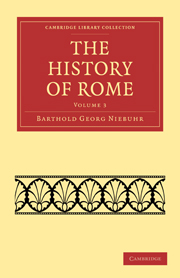Book contents
- Frontmatter
- PREFACE
- Contents
- The Licinian Rogations
- The new curule Dignities of the year 384
- Internal History down to the complete establishment of the plebeian Consulship
- On the Uncial Rate of Interest
- History of the Wars from 384 to 406
- Rome in Alliance with Latium
- The earliest Constitution of the manipular Legion
- The first Samnite War
- The Latin War
- The Laws of the Dictator Q. Publilius
- Internal History down to the Caudine Peace
- Alexander of Epirus
- Forein Relations down to the second Samnite War
- The second Samnite War
- Relations between Rome and the Nations bordering on Samnium after the Peace
- The Etruscan Wars down to the beginning of the third Samnite War
- Internal History from the Caudine Peace down to the third Samnite War
- Cn. Flavius
- The Censorship of Q. Fabius and P. Decius
- The Ogulnian Law
- Various Occurrences of the same Period
- The third Samnite War and the Others of the same Period
- Internal History from the Beginning of the second Samnite War down to the Lucanian
- Miscellaneous Occurrences of the same Period
- The Etruscan and Gallic War
- The Lucanian, Bruttian, fourth Samnite, and Tarentine Wars
- Epirus and Pyrrhus
- The Roman and Macedonian Tactics
- The War with Pyrrhus
- Entire Subjugation of Italy, and the Political Rights of the Italian Allies
- Internal History and Miscellaneous Occurrences of the Period from the Lucanian down to the first Punic War
- The first Punic War
- Index
- ERRATA
Internal History down to the Caudine Peace
Published online by Cambridge University Press: 01 June 2011
- Frontmatter
- PREFACE
- Contents
- The Licinian Rogations
- The new curule Dignities of the year 384
- Internal History down to the complete establishment of the plebeian Consulship
- On the Uncial Rate of Interest
- History of the Wars from 384 to 406
- Rome in Alliance with Latium
- The earliest Constitution of the manipular Legion
- The first Samnite War
- The Latin War
- The Laws of the Dictator Q. Publilius
- Internal History down to the Caudine Peace
- Alexander of Epirus
- Forein Relations down to the second Samnite War
- The second Samnite War
- Relations between Rome and the Nations bordering on Samnium after the Peace
- The Etruscan Wars down to the beginning of the third Samnite War
- Internal History from the Caudine Peace down to the third Samnite War
- Cn. Flavius
- The Censorship of Q. Fabius and P. Decius
- The Ogulnian Law
- Various Occurrences of the same Period
- The third Samnite War and the Others of the same Period
- Internal History from the Beginning of the second Samnite War down to the Lucanian
- Miscellaneous Occurrences of the same Period
- The Etruscan and Gallic War
- The Lucanian, Bruttian, fourth Samnite, and Tarentine Wars
- Epirus and Pyrrhus
- The Roman and Macedonian Tactics
- The War with Pyrrhus
- Entire Subjugation of Italy, and the Political Rights of the Italian Allies
- Internal History and Miscellaneous Occurrences of the Period from the Lucanian down to the first Punic War
- The first Punic War
- Index
- ERRATA
Summary
In several years of this period there appear symptoms of the patricians not having yet renounced the foolish dream, of winning back by stubbornness the privileges irrecoverably lost: their attempts, though tormenting and vexatious, did not endanger the peace, because, though they were inflexible enough to renew the contest continually, they were still not so rash as to venture upon extremes, when they encountered the resistance which they dreamt had ceast. Many were still alive in the vigour and maturity of their age, who retained the ineffaceable recollection of their old exclusive dominion and indignation at being conquered: it was necessary for another generation to step into their place, which knew of the olden time only as a matter of tradition, before there could be peace; and few of their grandchildren would have been so blind as to wish, even if it had been possible, to recover then what had been lost, and to take it in exchange for that which had arisen for them and for all: but the undertaking could not have succeeded, and the wiser descendants of both parties must have regarded it as the greatest good fortune, that irrational strife did not annihilate the equipoise in the republic by injuring the aristocracy.
The same feeling is manifested by a dictator being appointed for some time almost every year to hold the comitia for elections; but a plebeian raised to this dignity was compelled by absurd pretexts to lay it down; and after this fourteen interrexes followed, as on a former occasion five, before the election of the consuls was completed.
- Type
- Chapter
- Information
- The History of Rome , pp. 152 - 158Publisher: Cambridge University PressPrint publication year: 2010First published in: 1842



